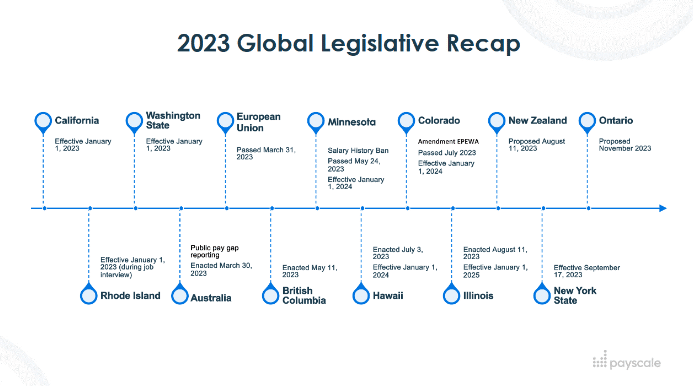2023 has truly been quite a year for the pay transparency movement. We saw over a dozen states in the U.S. propose some type of pay transparency law, we saw the European Union take a massive step forward in their efforts to combat the gender pay gap, and we saw several provinces in Canada take action to close their pay gaps too. Here, at Payscale, we also released our top predictions for HR and compensation management in 2024, and there is an entire section on Payscale’s legislative predictions for the new year. Check it out here.

In December, we still saw movement by some governments to get one step closer to passing pay transparency laws.
California
The California Privacy Protection Agency released draft regulations which, if passed, would require employers to disclose if they use artificial intelligence (AI) in any employment decisions. Specifically, the proposal would require employers to disclose how they intend to use any automated decision-making technology, and provide the ability for consumers to opt out of an employer’s use of AI. While this proposal is still in its early stages, this will be something to watch as we head into the new year.
New Jersey
In May 2022, New Jersey introduced AB 3937. If passed, this bill would require employers with 10 or more employees to include salary ranges in job postings. While this bill has not progressed in the last year and a half, it was recently approved in committee, and will likely pass before the New Jersey legislative session ends on January 8, 2024.
Washington, D.C.
On December 19, 2023, Washington, D.C.’s City Council passed the Wage Transparency Omnibus Amendment Act of 2023. While the bill still needs to be approved by Mayor Muriel Bowser and approved by the United States Congress, it is expected to be enacted on June 30, 2024.
If passed, this bill would require employers with 25 or more employees in the district to include the minimum and maximum projected salary (or hourly pay information) in all job postings. Additionally, employers would have to provide candidates with information about benefits of the role before the first interview. The bill would also put a salary history ban into effect for all employers in Washington, D.C.
British Columbia (additional guidance released)
On November 1, 2023, British Columbia enacted its pay transparency law. In December, the British Columbia government released additional guidance around the law. Here’s what you need to know:
- Salaries can be posted as a range or a fixed/non-negotiable amount, though there’s no additional guidance on how large or how small the range can be
- The range posted should be the “reasonable expectation of pay for the job at the time of posting”
- Employers must comply with the law if the position can be filled by a resident of British Columbia (i.e., all remote job postings must comply)
- Employers must also comply if their jobs are posted by third parties on job boards or if another agency posts the role on their behalf
As we can see from this additional guidance, British Columbia did not reinvent the wheel. Their pay transparency law requirements are very similar to the laws enacted in states like Colorado, California, and Washington.
REMINDER: Laws effective as of January 1, 2024
There is less than one month left to prepare for the laws that will take effect in the new year. While you are making your end-of-the-year to-do lists (and checking them twice!), we wanted to remind you of the laws that will come into effect as of January 2024:
- Amendment to Colorado’s Equal Work Act: January 1, 2024
- Hawaii’s Pay Transparency Law: January 1, 2024
- Minnesota’s Salary History Ban: January 1, 2024
- Australia’s Public Gender Pay Gap Reporting: first disclosure January 2024
Also worth noting is that earlier this year, the Equal Employment Opportunity Commission (EEOC) released its priorities for 2024-2028. They stated that “combatting pay discrimination and advancing equal pay” are main focuses for enforcement in the upcoming few years. As part of evaluating your organization’s priorities for the new year, ensuring equitable and fair pay amongst your incumbent employees should be at the top of the list.
Payscale’s Pay Transparency Solution
At Payscale, we believe in helping our customers approach pay transparency with confidence.
The Payscale solution delivers organizations of all sizes comprehensive technology and professional services to help them, develop a strong compensation strategy and reach pay transparency objectives quickly. Build pay ranges with confidence, facilitate meaningful pay conversations to communicate pay internally and externally, and embed fair pay practices with Payscale.
Learn more about how Payscale can help your organization achieve pay transparency.
Want to learn more from our experts?
Payscale hosts an ongoing pay transparency legislation webinar series to help organizations stay up to date.
In our most recent episode, Episode 9: Navigate the Changing Global Landscape, we provided an update on global legislation, including New York, and best practices on how to respond.
Access the most recent episode on demand here.
Stay up to date with the latest pay transparency legislation on our pay legislation tracking page here, which includes a library of the full pay transparency webinar series.



